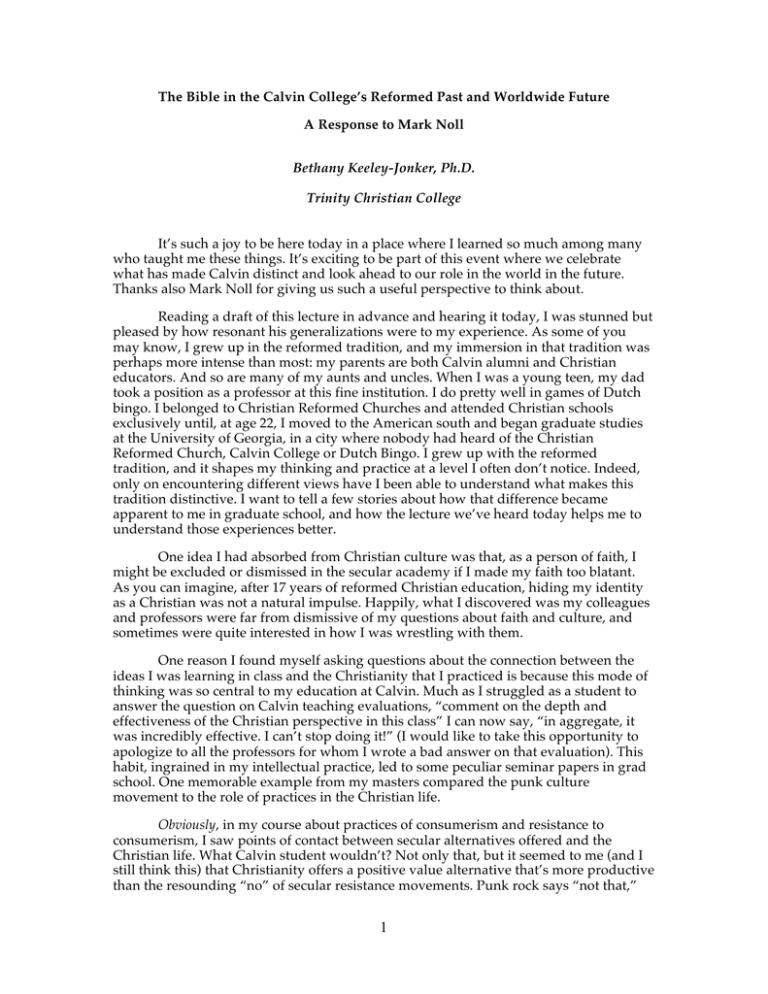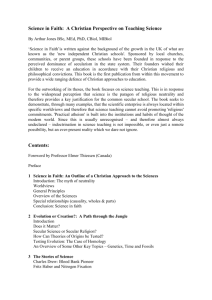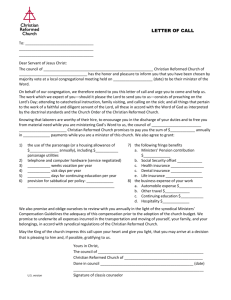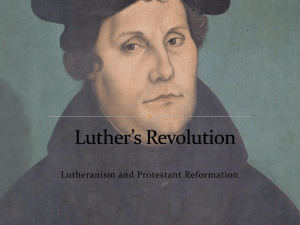The Bible in the Calvin College’s Reformed Past and Worldwide... A Response to Mark Noll
advertisement

The Bible in the Calvin College’s Reformed Past and Worldwide Future A Response to Mark Noll Bethany Keeley-Jonker, Ph.D. Trinity Christian College It’s such a joy to be here today in a place where I learned so much among many who taught me these things. It’s exciting to be part of this event where we celebrate what has made Calvin distinct and look ahead to our role in the world in the future. Thanks also Mark Noll for giving us such a useful perspective to think about. Reading a draft of this lecture in advance and hearing it today, I was stunned but pleased by how resonant his generalizations were to my experience. As some of you may know, I grew up in the reformed tradition, and my immersion in that tradition was perhaps more intense than most: my parents are both Calvin alumni and Christian educators. And so are many of my aunts and uncles. When I was a young teen, my dad took a position as a professor at this fine institution. I do pretty well in games of Dutch bingo. I belonged to Christian Reformed Churches and attended Christian schools exclusively until, at age 22, I moved to the American south and began graduate studies at the University of Georgia, in a city where nobody had heard of the Christian Reformed Church, Calvin College or Dutch Bingo. I grew up with the reformed tradition, and it shapes my thinking and practice at a level I often don’t notice. Indeed, only on encountering different views have I been able to understand what makes this tradition distinctive. I want to tell a few stories about how that difference became apparent to me in graduate school, and how the lecture we’ve heard today helps me to understand those experiences better. One idea I had absorbed from Christian culture was that, as a person of faith, I might be excluded or dismissed in the secular academy if I made my faith too blatant. As you can imagine, after 17 years of reformed Christian education, hiding my identity as a Christian was not a natural impulse. Happily, what I discovered was my colleagues and professors were far from dismissive of my questions about faith and culture, and sometimes were quite interested in how I was wrestling with them. One reason I found myself asking questions about the connection between the ideas I was learning in class and the Christianity that I practiced is because this mode of thinking was so central to my education at Calvin. Much as I struggled as a student to answer the question on Calvin teaching evaluations, “comment on the depth and effectiveness of the Christian perspective in this class” I can now say, “in aggregate, it was incredibly effective. I can’t stop doing it!” (I would like to take this opportunity to apologize to all the professors for whom I wrote a bad answer on that evaluation). This habit, ingrained in my intellectual practice, led to some peculiar seminar papers in grad school. One memorable example from my masters compared the punk culture movement to the role of practices in the Christian life. Obviously, in my course about practices of consumerism and resistance to consumerism, I saw points of contact between secular alternatives offered and the Christian life. What Calvin student wouldn’t? Not only that, but it seemed to me (and I still think this) that Christianity offers a positive value alternative that’s more productive than the resounding “no” of secular resistance movements. Punk rock says “not that,” 1 Christianity says “this instead.” If nothing else, I amused my colleagues and conference respondents by bringing up terms like hospitality and communal worship alongside Johnny Rotten and the Dada movement. As this example illustrates, my preoccupation with linking any topic to application in the Christian life and application of the Bible can lead to some creative, if weird, perspectives. I think this weirdness provides reformed Christians and Christians generally with something specific to offer to academic inquiry. I find myself frequently turning to the Christian tradition for resources to work with some of the challenging questions in my discipline. For example, Christians have been thinking for centuries about relationships between spirit and body, physical and non-physical reality. When new rhetorical theory asks “in what sense is language material” I can relate that question to one I have long struggled with, “what does it mean when John writes that the word was made flesh and dwelt among us?” Of course, my experience might be particularly sunny, because the task of “putting the Bible to use” is of interest to others who, like me, study rhetoric. Even if my colleagues don’t share my commitment to the Bible as a starting point, they can join me in an analysis of how it is used in culture by different Christians, and what that might mean for various communities. That perspective, which I inherited, again, without much thought to alternatives, allowed me to start with the bible, but join in inquiry with others who start elsewhere. Rather than entering arguments about the identity, or truth, or value of the Bible, I attempted to demonstrate the value of my belief through application. I’ll admit this tactic for evangelism doesn’t lead to a lot of recitations of the sinner’s prayer – it’s slower. But, it did allow me to remain in conversation with others, learn from them, and I hope show them some of the truth I learn from my reading of the Bible in Christian community, and my relationship with a triune God. My writing for Think Christian, a blog run by Back to God Ministries, another group in the reformed tradition, tends to follow a similar tactic. Similarly, that thinking and writing has led to positive interactions with journalists, bloggers and academics I met outside of the Calvin network, who respect the kind of thinking Calvin has taught me to do. I wonder if this approach can help us simultaneously encourage the flourishing of others, regardless of their beliefs, and to demonstrate the merits of our particular world-view. It seems, to me, to lend itself to a posture of “offering truth with an open hand” as an alumna friend of mine likes to quote from Ghandi. I also want to mention a second and related element of this approach that has made an impact on my scholarly work and relationship to others, Christian and not. I have often said that when I was at Calvin I did not feel like I needed to defend my faith or the Bible to others. I thought for many years this was an advantage of a Christian context: since we see faith as a shared baseline, some apparent challenge to that faith was easier to approach. I didn’t feel responsible for representing my faith to others in my class or my professor, so it meant I didn’t have to fear charges of hypocrisy if I approached an idea counter to my faith. Instead, I expected and received understanding that I was learning and growing in my faith alongside others. After hearing the perspective today I believe the reformed tradition is especially equipped to create this environment for growth. This has meant, for me, I have been able to tolerate my discomfort when I read some ideas or encounter elements that conflict with my understanding of the Bible. This has allowed me to learn from people and scholars who disagree in some fundamental way but also have insights and observations that have been useful. But I sometimes wonder if the very tolerance I take pride in makes it more 2 difficult to communicate a distinctively Christian way of approaching these questions. Partly because it just takes me longer to get to that Christian answer, and the kind of parsing that leads to that position may not be so welcome to all audiences. Naming this difference has made sense of an interaction that long troubled me. I taught a course titled Rhetoric of Religion in American Public Discourse at the University of Georgia. My question in the class was about how religious perspectives influence the kinds of arguments people make in American history. This seemed an appropriate center for a communication course, and it also meant that the course itself was agnostic about the truthfulness of various religious beliefs. One particularly outspoken evangelical student in my class became so frustrated he wrote in his term paper, rather than the analysis I requested, that he was frustrated with the class; he came prepared to defend his faith, but was finding that hard given the set-up of the class. I considered this a pedagogical victory: I set up my public university course so that class discussion not become a referendum on various student’s religious beliefs. But I also saw it as a failure. Though the student saw the difference between the kind of argument he wanted to have and the kind I had designed the class around, he seemed only able to name that difference, not engage the perspective I offered. Now I understand why it was so much easier for me than it was for this student: I had, at that point, 26 years of practice, more or less, in a tradition that values discussing the implications of and applications of Biblical ideas. Perhaps, if I could take a time machine back to that semester, I could better define for this student and for all my students the kinds of questions I was preoccupied with in the class early in the semester. I wonder, too, if Calvin students generally might benefit from more explicit instruction in how a reformed perspective fits in among other approaches to Christian faith, to better equip us for our interactions with brothers and sisters in Christ who approach thinking about their faith differently. To conclude, then, in my experience the practices of thought ingrained in me at Calvin College have been very useful in finding ways to talk about my faith and make sense of it in the context of secular academia in the humanities, even and especially in recent years. Certainly, not all Alumni make this habit so central to their careers as I have, but as I converse with my fellow alumni, read their facebook postings and hear about their careers, I see a spirit of generous thoughtfulness in the lives of my peers. It seems that there are, indeed, many square inches which Calvin alumni are working on renewing. Our Reformed perspective has given us the opportunity to keep feet in both worlds so that we can speak to the academy while also holding fast to our faith. Calvin’s history is one of doing that well, and equipping students to do the same. I think it is a flexible posture that can serve us and help us to make connections among diverse groups of christians and people with other beliefs as well as we move into the future. 3



